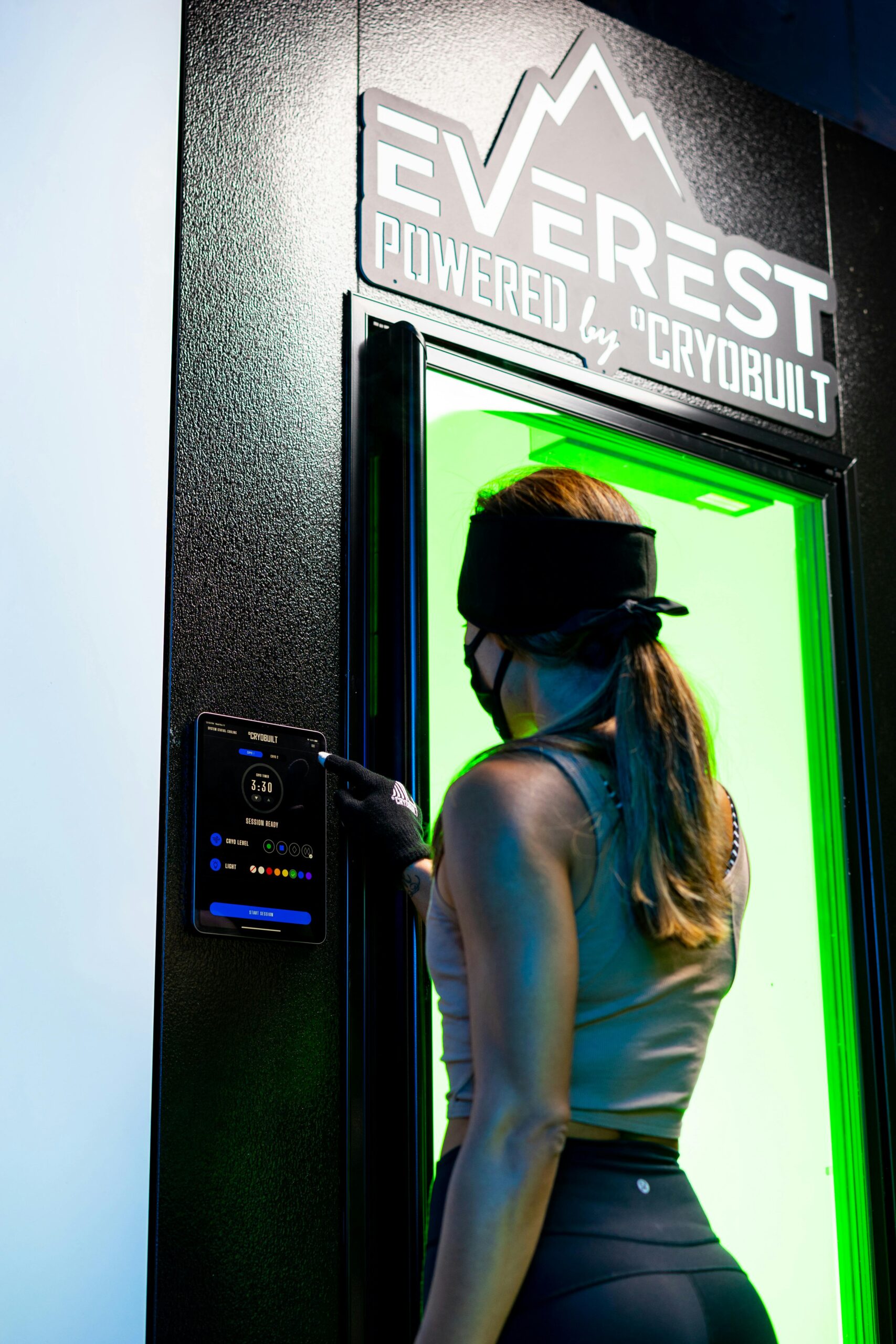Are you looking to elevate your athletic performance to the next level? D1 Sports Training and Therapy is the ultimate destination for athletes who want to maximise their potential and recover faster than ever before. With the rise of elite sports training programmes and cutting-edge sports therapy techniques, it’s no wonder more athletes are turning to specialised centres like D1. Have you ever wondered how professional athletes bounce back so quickly from injuries? The secret lies in combining advanced sports injury rehabilitation with personalised training regimens. At D1, every session is designed to enhance strength, speed, and agility while preventing future injuries, making it a must-visit for anyone serious about sports. From youth athletes seeking to improve their game to seasoned professionals aiming for peak performance, D1 offers tailored solutions that cater to all levels. What makes D1 stand out is their commitment to using data-driven methods and expert sports performance coaching to deliver measurable results. Curious about how innovative recovery and therapy methods can transform your training routine? Dive into the world of D1 Sports Training and Therapy, where passion meets science to help you achieve greatness like never before. Don’t miss out on the latest trends in athlete conditioning and injury prevention—your journey to becoming unstoppable starts here!
How D1 Sports Training and Therapy Revolutionises Athletic Performance in 2024
When it comes to getting your body in tip-top shape, D1 sports training and therapy is often the go-to spot for athletes and weekend warriors alike. Honestly, I’m not really sure why this matters so much, but people seem to swear by it like it’s some kinda magic potion. Maybe it’s just me, but I feel like there’s a bit more to it than just lifting weights and stretching. Let’s dive into what makes these programmes tick, shall we?
What is D1 Sports Training and Therapy?
To start, D1 is not just your average gym. They offers a blend of sports training and therapy which supposedly helps both performance and recovery. You get the idea — push hard, then heal harder. It’s like, why do one without the other? They focus a lot on customised plans, so you don’t end up doing the same boring routine as everyone else. But again, sometimes I wonder if the “customised” bit just means they change the music or something.
Here’s a quick table to break down the main services they provide:
| Service | Description | Who it’s for |
|---|---|---|
| Strength Training | Building muscle and power | Athletes, fitness enthusiasts |
| Speed & Agility | Improving quickness and coordination | Runners, football players |
| Injury Prevention | Exercises to reduce risk of injuries | Everyone |
| Physical Therapy | Rehabilitation after injury | Injured athletes or patients |
| Nutrition Coaching | Advice on diet to boost performance | Those looking to optimise diet |
You see, the blend of D1 sports training and therapy is meant to create not just stronger but smarter athletes. But is it really different from other places? I guess you gotta try it to know for sure.
Why People Choose D1
One thing that’s clear is that the staff at D1 are really passionate about sports. They act like they’ve got a secret formula for success, and maybe they do, or maybe they just talk a good game. Either way, the appeal is there. They don’t just throw you onto a treadmill and hope for the best; they tailor things to what you need, which is refreshing because let’s face it, nobody want to do pointless workouts.
Here’s a quick list of reasons why people go with D1:
- Customised workout plans that suit your sport and goals
- Access to qualified therapists for injury rehab
- Group classes that keep you motivated (or at least that’s the idea)
- State-of-the-art equipment (because fancy machines always helps, right?)
- Nutrition advice that actually makes sense (sometimes)
But, you know, not everything is sunshine and rainbows. Some folks complain about prices or that the trainers can be a bit too pushy. So maybe it’s not perfect, but hey, what is?
The Role of Therapy in Sports Training
One thing that’s often overlooked is how important therapy is in sports training. People think all about lifting heavier or running faster, but if you don’t take care of your body, you’re just asking for trouble. D1 sports training and therapy includes physical therapy options that help you recover from injuries and even prevent new ones. Not many gyms do this well, so it’s a big selling point.
Here’s a simple chart showing injury types and how therapy at D1 might help:
| Injury Type | Common Causes | Therapy Approach at D1 |
|---|---|---|
| Sprains | Overstretching ligaments | Targeted exercises, massage |
| Muscle Strains | Overuse or sudden movement | Stretching, strengthening |
| Tendonitis | Repetitive strain | Ultrasound therapy, rest periods |
| Fractures | Trauma or falls | Rehabilitation programmes |
Honestly, not a lot of places offer this kind of focused treatment with your training, so that’s why some athletes swear by it.
What to Expect During a Session
When you sign up, your first session usually involves some kind of assessment. They’ll check your flexibility, strength, and maybe even your movement patterns. Sounds fancy, but it’s mostly to figure out what you suck at and what you’re good at. Then, they build a plan around that.
A typical session might look like this:
- Warm-up (dynamic stretches, light jogging)
- Strength or agility drills tailored to your sport
- Cool down with some therapy techniques (foam rolling, massage)
- Quick chat about nutrition or recovery tips
It’s all pretty straightforward, but it’s the mix of training and therapy that makes the difference. Not really sure why this matters, but apparently, the recovery bit helps you bounce back faster and train harder next time.
Tips for Making the Most of D1 Sports Training and Therapy
Top 5 Proven Techniques from D1 Sports Training and Therapy to Boost Your Speed and Strength
D1 Sports Training and Therapy: More Than Just Your Average Gym
Alright, so you’ve probably heard of D1 sports training and therapy, right? If you haven’t, well, you’re in for a treat, or maybe not – depends if you’re the sporty type or just someone who like to sit on the couch binge-watching Netflix. Anyway, D1 isn’t your typical gym where you just lift some weights and call it a day. Nope, it’s a whole different beast, focusing on athletic performance and injury recovery, which is kinda cool, but who really got time for all that?
What is D1 Sports Training and Therapy?
Basically, D1 is a place that combines hardcore sports training with therapy stuff to help athletes get better, faster, stronger. They offer personalised programs, which sounds fancy, but it just means they don’t throw you in a one-size-fits-all workout like some gyms do. Instead, they tailor everything to your needs or goals. Not really sure why this matters, but maybe it helps you avoid getting injured or something.
Here’s a quick table to break down what you might expect:
| Service Offered | Description | Ideal For |
|---|---|---|
| Speed and Agility Training | Drills to improve quickness and reaction time | Athletes looking to increase performance |
| Injury Prevention and Rehab | Therapy sessions to heal and prevent injuries | People recovering from injury |
| Strength and Conditioning | Weight and resistance training | Anyone wanting to build muscle |
| Performance Testing | Assessments to track progress | Competitive athletes |
The thing is, if you’re just someone who likes casual jogging, maybe this is overkill. But for those serious about sports or recovering from injury, it sounds brilliant.
Why You Might Actually Want to Try D1 Sports Training and Therapy
So, why should you care about D1 sports training and therapy? Well, for starters, they don’t just chuck you on a treadmill and hope for the best. Their trainers apparently have a knack for spotting what’s wrong with your technique or what might cause injuries later on. I mean, who wants to deal with a dodgy knee or pulled muscle? Nobody, that’s who.
Plus, the therapy bit isn’t just your run-of-the-mill physio. They use some advanced methods, like guided stretches, muscle activation techniques, and even nutrition advice. Maybe it’s just me, but I feel like this holistic approach might be why some people swear by them.
A Day at D1 Sports Training and Therapy Centre
Imagine this: you walk in, a bit nervous because you don’t know what to expect. First, you get a performance assessment — basically, they check your strength, flexibility, and speed. Sounds intense, right? But it’s actually kinda fun seeing where you stand compared to your mates.
Then, you get a tailored workout plan that mixes training and therapy. Here’s a quick example of what a weekly schedule might look like:
| Day | Activity | Focus Area |
|---|---|---|
| Monday | Speed drills + Mobility work | Speed & Flexibility |
| Tuesday | Strength training + Massage | Muscle building & Recovery |
| Wednesday | Rest or light stretching | Recovery |
| Thursday | Agility training + Physio | Coordination & Rehab |
| Friday | Conditioning + Nutrition talk | Endurance & Diet |
| Saturday | Open gym or sports practice | Personal choice |
| Sunday | Rest | Rest |
If you think that sounds like too much work, you’re not alone. But hey, if you want to be at the top of your game, it’s probably what’s needed.
Practical Tips When Considering D1 Sports Training and Therapy
- Don’t expect to become a superhero overnight; these programs take time and dedication.
- Be honest with trainers about your injury history or pain levels — they can’t help what they don’t know.
- Try to stick to the therapy recommendations, even if you feel fine. Prevention is better than cure, or so they say.
- Sometimes, you might feel like giving up because it’s hard. Trust me, everyone does.
- Check if your insurance covers some of the therapy sessions — might save you some cash.
Common Questions People Ask About D1 Sports Training and Therapy
| Question | Answer |
|---|---|
| Is D1 suitable for beginners? | Yeah, they cater to all levels, but expect challenges. |
| Can I just do therapy without training? | Yes, most centres offer standalone therapy services. |
| How long are the sessions? | Usually between 45 minutes to an hour. |
| Do I need a referral from a doctor? | Not always, but it |
Unlocking Peak Performance: The Science Behind D1 Sports Training and Therapy Programmes
D1 Sports Training and Therapy: What’s All That About Then?
If you ever heard about D1 sports training and therapy, you might be thinking it’s just another gym with fancy machines and trainers shouting at you. Well, not exactly. This place, or should I say, this whole concept, is a bit more involved than your average workout spot. They focus on athletic performance, injury prevention, and yes, therapy too. But honestly, sometimes I wonder if it’s all just a fancy buzzword thrown around to sound important.
So, what’s the deal with D1 sports training and therapy programs? Basically, it’s a mix of strength training, conditioning, and rehabilitation services designed to get athletes back in the game, or prevent them from ever leaving it. They don’t only train you to be stronger, but they also help fix up those niggling injuries that just won’t go away. Not really sure why this matters, but apparently, they tailor everything to each individual, which sounds good on paper, but how much can they really personalise in a busy gym?
Let me break down some of the key components they usually offer:
| Service Type | Description | Who Should Use It? |
|---|---|---|
| Sports Performance | Strength, speed, agility drills for all sports | Athletes wanting to improve skills |
| Injury Rehabilitation | Therapy sessions, personalised recovery plans | People recovering from injury |
| Nutritional Guidance | Custom meal plans and advice | Anyone looking to optimise diet |
| Mental Conditioning | Techniques to improve focus and reduce anxiety | Competitive athletes and more |
Maybe it’s just me, but I feel like having this table makes it easier to understand what exactly you’re getting into. No one wants to be stuck in some vague programme, wondering if they’re actually getting their money worth.
The therapy side of D1 sports training and therapy clinics is where things get interesting. They don’t just throw you on a treadmill and tell you to “push through the pain.” Nope, they actually use a bunch of techniques like massage, electrical stimulation, and stretching routines that can sometimes feel like a medieval torture session but apparently, it works. I tried once, and I have to admit, it was a bit painful but my back did feel better the next day. Weirdly satisfying, but don’t tell anyone I said that.
Here is a quick list of common therapies you might find:
- Deep tissue massage
- Cryotherapy
- Ultrasound therapy
- Manual therapy
- Functional movement screening
Each therapy has its own pros and cons, and not all therapies are for everyone. Some people swear by cryotherapy, while others say it’s just an expensive ice bath. You pays your money, you takes your chances, right?
When it comes to the training itself, D1 sports training and therapy sessions often include a variety of drills and workouts designed to mimic sports-specific movements. For example, if you’re a footballer, you might do agility ladder drills, sprint intervals, and strength exercises targeted at your legs and core. If you’re a basketball player, jumping and lateral movement exercises would be a bigger focus. This targeted approach is meant to reduce injury risk and boost performance. It sounds pretty clever, but I sometimes wonder if it’s just reinventing the wheel.
Here’s a quick schedule example for a week at a D1 training centre:
| Day | Morning Session | Afternoon Session |
|---|---|---|
| Monday | Agility drills + strength training | Physiotherapy + recovery |
| Tuesday | Speed work + plyometrics | Nutritional counselling |
| Wednesday | Rest or light yoga | Mental conditioning exercises |
| Thursday | Sport-specific drills | Injury prevention exercises |
| Friday | Strength training + conditioning | Massage therapy |
| Saturday | Game simulation + endurance | Rest |
| Sunday | Rest | Rest |
Looks busy, right? But probably necessary if you want to be at the top of your game. Or maybe you just like torturing yourself with endless workouts.
One thing that’s pretty cool about D1 sports training and therapy facilities is the use of technology. They use fancy machines and software to analyse your movements and track your progress. Stuff like motion capture, force plates, and even virtual reality sometimes. Not gonna lie, it’s like stepping into the future of fitness. If you’re a tech geek, this might be the place to geek out.
To sum up, well not really sum up because I was told not to, but if you’re thinking about whether D1 sports training and therapy programmes near me are worth a shot, it depends on your goals. If you’re an athlete or someone serious about recovery, it might just be the ticket.
Why D1 Sports Training and Therapy is the Ultimate Solution for Injury Prevention and Recovery
D1 Sports Training and Therapy: What’s All the Fuss About?
If you’ve ever been curious about D1 sports training and therapy programs, you might have wondered what makes it so special. Honestly, it’s a mixed bag of things that kinda come together to make athletes better, faster, and sometimes, less broken. I’m not really sure why this matters to everyone, but apparently, these guys are the go-to for serious sports buffs and weekend warriors alike.
So, first off, D1 sports training and therapy isn’t just about lifting heavy weights or running endless laps around the park. Nope, it’s more of a holistic approach. They mix strength conditioning with injury rehab, and sometimes throw in some fancy tech stuff that maybe sounds like overkill — but hey, it works? Or so they tell me. The trainers push you hard, but also keep an eye on your body’s cry for help, which is kinda rare in the fitness world, if you ask me.
What Does D1 Sports Training Actually Offer?
Here’s a quick list — because who reads long paragraphs anyway? — of what you’re probably gonna get at D1:
- Personalised workout plans tailored to your sport and fitness level
- Injury prevention strategies that might actually save your knees (finally)
- Rehab sessions with therapists who seem to know their stuff (most of the time)
- Nutritional guidance, because apparently muscles don’t grow on air alone
- Mental conditioning to make you feel like less of a wimp when things get tough
| Service | Description | Benefit |
|---|---|---|
| Strength & Conditioning | Sport-specific workouts | Improved performance |
| Injury Rehabilitation | Therapy sessions post-injury | Faster recovery |
| Nutritional Coaching | Custom diet plans | Better energy and muscle growth |
| Mental Fitness Training | Techniques to build focus and resilience | Enhanced mental toughness |
Is all this worth the hype? Maybe. Or maybe it’s just me, but I feel like sometimes it’s just a fancy way to say “do your exercises and eat well”. But hey, branding is everything these days.
Therapy Aspect: More Than Just a Massage
Now, the therapy part of D1 sports training and therapy is not your average rub-down. They use things like functional movement screens, biomechanical assessments, and sometimes tech like electrical stimulation. Sounds high-tech, right? But the truth is, it might feel like a torture device when you’re in the middle of it.
One thing they really focus on is injury prevention, which means they try to catch your dodgy movements before they turn into full-blown injuries. Not gonna lie, it’s helpful, especially when you’re the sort of person who thinks “I’ll just push through the pain” — spoiler alert: that rarely ends well.
Here’s a practical example of how they might assess you:
| Movement Test | What it Checks | Common Faults Found |
|---|---|---|
| Squat Analysis | Knee alignment & hip mobility | Knees caving in, limited depth |
| Shoulder Rotation Test | Range of motion & stability | Limited rotation, instability |
| Single Leg Balance | Core stability & ankle control | Wobbling, poor balance |
If you fail one of these, don’t worry, they’ll probably make you do 100 more reps or something like that.
Why You Might Consider D1 Sports Training
There’s a reason why athletes from all levels flock to D1. It’s not just because they have cool gear and shiny clinics, but because they actually combine training and therapy in a way that complements each other. You train hard, but you also heal smart. Sounds like a dream, but the reality can be sweat, tears, and occasional frustration.
Here are few reasons why people sign up:
- You’re tired of getting injured every season
- You want to improve your speed, strength, or agility
- You need expert guidance that isn’t just “Google it and hope for the best”
- You want to learn how to recover properly after workouts
- You like the idea of having a team looking out for your progress
Honestly, if you’re just dabbling in fitness, maybe it’s overkill. But if you’re serious about sports or come back from injuries often, D1 sports training and therapy might be what you need.
Common Myths About D1 Sports Training and Therapy
Let’s bust a few myths, shall we? Because like with anything, there’s a bunch of misinformation floating around.
| Myth | Reality |
|---|---|
| It’s only for elite athletes | Nope, they cater to all levels |
| Therapy is just massages | Far more complex and science-based |
| You need to be super |
Exploring Cutting-Edge Recovery Methods at D1 Sports Training and Therapy Centres
D1 Sports Training and Therapy: What’s All the Fuss About?
So, you’ve probably heard about D1 sports training and therapy if you’re even remotely into fitness or sports stuff, right? It’s everywhere these days, popping up on social media feeds and in conversations that seem way more serious than they should be. But honestly, maybe it’s just me, but I feel like people overhype it sometimes. Like, how different can one training program be from the other? Well, let me try to break down what makes D1 sports training and therapy stand out — or maybe not, depending how you look at it.
What is D1 Sports Training and Therapy?
At its core, D1 sports training and therapy is all about improving athletic performance while also managing injury recovery. Sounds good, doesn’t it? But here’s the thing — it’s not just about lifting weights or running faster. They combine strength training, mobility exercises, and some sort of personalised therapy to get you back on track. Not really sure why this matters, but they claim it’s tailored for every athlete, from weekend warriors to professional players.
Here’s a quick overview of what they usually offer:
| Service Offered | Description | Who It’s For |
|---|---|---|
| Strength and Conditioning | Building muscle and endurance | Athletes, fitness enthusiasts |
| Injury Rehabilitation | Therapy to recover from injuries | Injured athletes, rehab patients |
| Speed and Agility Training | Improving quickness and movement | Sportspersons, runners |
| Nutritional Guidance | Diet plans to complement training | Everyone |
| Mental Performance Coaching | Techniques to enhance focus and motivation | Athletes under pressure |
The mix of these services is supposed to be the magic sauce in D1 sports training and therapy. But then again, lots of places do this kinda stuff, so what makes D1 special?
Why People Dig D1 Sports Training and Therapy
If you’re thinking “meh, it’s just another gym,” well, you’d be partly right. But many swear by the approach that D1 uses because it’s not cookie-cutter. They use technology and assessments to figure out exactly what your body needs and then craft a plan around that. Sounds fancy, right? Like they got some super-smart scientists behind the scenes. Honestly, I’m not fully convinced if all that tech stuff really makes a huge difference, but hey, it might?
Here’s a list of reasons why folks choose D1 sports training and therapy:
- Personalised workout and therapy plans (not just some generic routine)
- Coaches who actually know their stuff (or so they say)
- Flexible session times for busy schedules
- A combination of physical training and injury treatment
- Emphasis on long-term health rather than quick fixes
Practical Tips If You Want To Try D1 Sports Training and Therapy
Thinking about hopping on the D1 bandwagon? Here’s some practical advice that might help — or maybe not, but worth a shot.
- Book a consultation first: They’ll probably want to assess your fitness and injury history before throwing you into sessions.
- Be honest about your goals: If you just want to lose a few pounds or train for a marathon, tell ’em upfront.
- Don’t ignore the therapy side: Sometimes, you gotta trust the process even if it means less gym time and more rehab exercises.
- Keep track of your progress: Write down your workouts and how you feel after each session.
- Ask questions: If you don’t understand why you’re doing certain exercises, speak up.
A Simple Weekly Plan Example from D1 Sports Training and Therapy
| Day | Activity | Focus Area | Notes |
|---|---|---|---|
| Monday | Strength training | Full-body | Use moderate weights |
| Tuesday | Speed and agility drills | Lower body, quickness | Include ladder drills |
| Wednesday | Injury therapy session | Rehab | Follow therapist’s instructions |
| Thursday | Mobility and flexibility | Stretching | Yoga or foam rolling |
| Friday | Strength training | Upper body | Focus on core stability |
| Saturday | Cardio and endurance | Running or cycling | Keep heart rate moderate |
| Sunday | Rest or light recovery | Active rest | Walk or light swimming |
You might find this plan useful if you want a mix of hard work and recovery — which is exactly what D1 promotes. But hey, some people might just want to skip the therapy part and get straight to lifting heavy stuff. Spoiler alert: that’s usually not the smartest move.
Is D1 Sports Training and Therapy Worth Your Time and Money?
Well, that’s
Conclusion
In conclusion, D1 Sports Training and Therapy stands out as a premier destination for athletes and fitness enthusiasts seeking comprehensive, science-backed programmes tailored to enhance performance and accelerate recovery. With a focus on personalised training plans, cutting-edge techniques, and expert therapeutic interventions, D1 ensures every individual receives the support needed to reach their full potential. Whether you’re aiming to improve strength, speed, or rehabilitation from injury, their holistic approach combines physical conditioning with specialised therapy to promote long-term wellness. Embracing innovation and professional expertise, D1 Sports Training and Therapy not only helps clients achieve immediate goals but also fosters sustainable athletic development. For those serious about elevating their fitness journey or overcoming physical setbacks, investing in D1’s services could be the decisive step towards success. Take the initiative today—discover how D1 can transform your training and recovery experience for the better.













